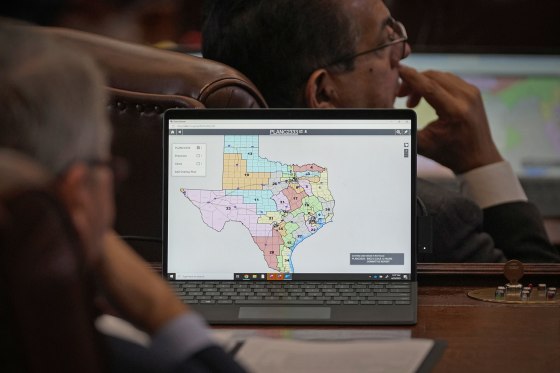The Republican-controlled Texas state Senate passed the party’s new congressional maps overnight, completing a legislative odyssey that included significant Democratic delays and sparked a nationwide scramble over redistricting in the process.
The vote means the maps, which were designed to pad the Republican majority in the U.S. Congress, will go into effect when signed by Gov. Greg Abbott, a proponent of the plan who has been cheered on by President Donald Trump.
Democrats have promised to challenge the measure in court.
Trump initially led the calls for Texas to redraw its congressional map, saying his party is “entitled to” five more congressional seats from the state. That’s what the maps intend to do: By redrawing congressional district boundaries in key cities as well as along the state’s border, Texas will have 30 congressional districts that Trump carried last fall by a double-digit margin.
The GOP currently controls 25 of the state’s 38 congressional districts.
Republicans have been adamant, and blunt, from the start of the process that their exercise has been a political one aimed solely at increasing their party’s power in Washington, where the House is almost evenly balanced. Democrats need a net gain of just three seats in the 2026 elections to take the majority.
Democrats have accused Republicans of setting a dangerous precedent by not waiting until 2031 to redraw the lines, as is customary, and they said the new maps would hurt minority representation in the state, a charge their Republican colleagues denied.
Unlike the state House, where business ground to a halt earlier this month when dozens of Democrats fled the state to deny the body a quorum to move forward with legislation, forcing Abbott to call another special session, the Senate has not been stymied by those efforts.
The move drew swift condemnation from opponents of the measure.
"This is not democracy, this is disgraceful," State Sen. Sarah Eckhardt said on X.
Democrats had planned to push back the Senate vote into the morning Saturday in a last-ditch attempt to delay passage.
Earlier, State Sen. Carol Alvarado, leader of the Senate Democratic caucus, announced on social media that she planned to filibuster the bill with a long speech and intended to speak for several hours. But just when she expected to start, the Senate broke for a long dinner break.
When members returned, Alvarado never had a chance to filibuster because Republicans accused her of breaking Senate rules by attempting to fundraise off the coming filibuster.
Sen. Charles Perry said it “appears to be potentially unlawful, at least unethical, using state resources for a campaign purpose.”
With Abbott poised to sign the new maps into law, the spotlight shifts to California, where Democratic lawmakers have their own proposal to redraw their state's congressional boundaries as political retribution for Texas' move. Unlike in Texas, where regular legislation is enough to change the maps, California Democrats' proposal must also be approved by the voters in a special election this fall in order to take effect.

